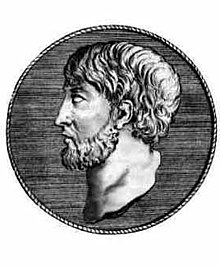Anaximenes of Miletus
| Anaximenes of Miletus | |
|---|---|

Anaximenes of Miletus
|
|
| Born | c. 585 BC |
| Died | c. 528 BC |
| Era | Pre-Socratic philosophy |
| Region | Western Philosophy |
| School | |
|
Main interests
|
Metaphysics |
|
Notable ideas
|
Air is the arche |
|
Influences
|
|
Anaximenes of Miletus (/ˌænækˈsɪməˌniːz/; Greek: Ἀναξιμένης; c. 585 – c. 528 BCE) was an Ancient Greek Pre-Socratic philosopher active in the latter half of the 6th century BC. One of the three Milesian philosophers, he is identified as a younger friend or student of Anaximander. Anaximenes, like others in his school of thought, practiced material monism. This tendency to identify one specific underlying reality made up of a material thing is what Anaximenes is principally known for today.
While his predecessors Thales and Anaximander proposed that the archai (singular: arche, meaning the underlying material of the world) were water and the ambiguous substance apeiron, respectively, Anaximenes asserted that air was this primary substance of which all other things are made. The choice of air may seem arbitrary, but Anaximenes based his conclusion on naturally observable phenomena in the processes of rarefaction and condensation. When air condenses it becomes visible, as mist and then rain and other forms of precipitation. As the condensed air cools Anaximenes supposed that it went on to form earth and ultimately stones. In contrast, water evaporates into air, which ignites and produces flame when further rarefied. While other philosophers also recognized such transitions in states of matter, Anaximenes was the first to associate the quality pairs hot/dry and cold/wet with the density of a single material and add a quantitative dimension to the Milesian monistic system.
...
Wikipedia
